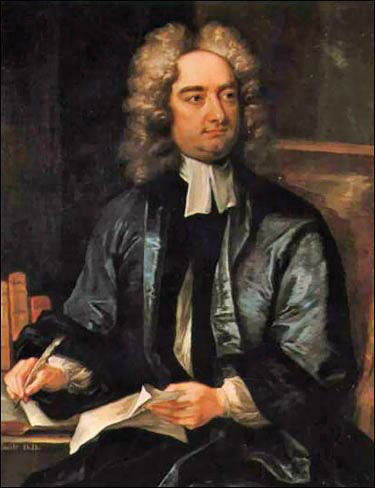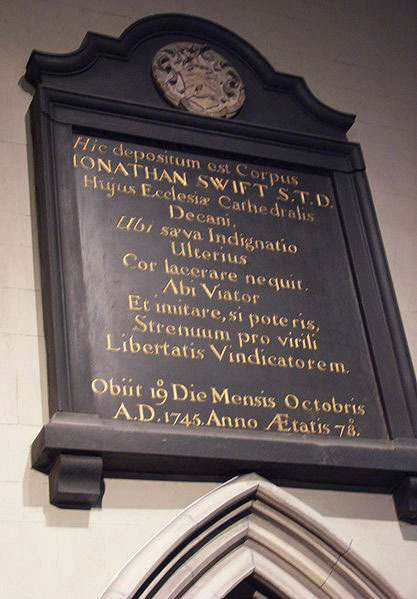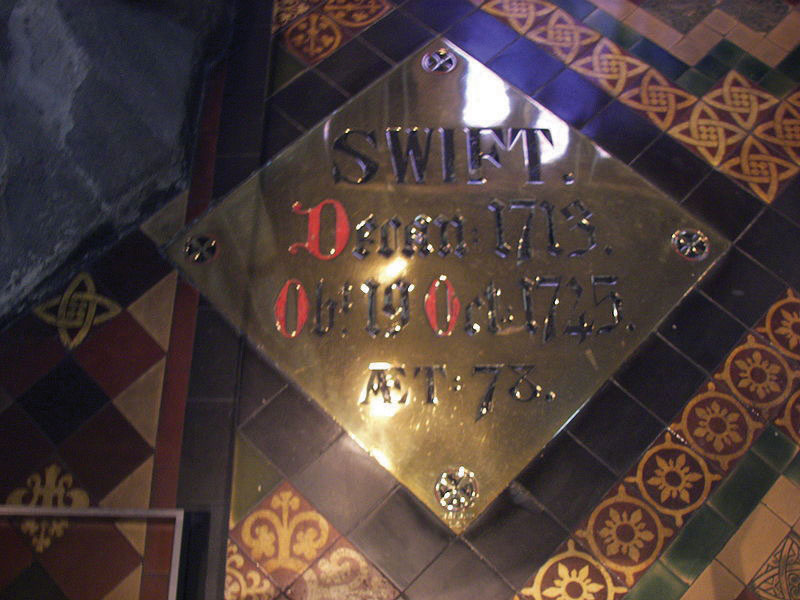This is “Jonathan Swift (1667–1745)”, section 5.2 from the book British Literature Through History (v. 0.1). For details on it (including licensing), click here.
For more information on the source of this book, or why it is available for free, please see the project's home page. You can browse or download additional books there. To download a .zip file containing this book to use offline, simply click here.
5.2 Jonathan Swift (1667–1745)
PLEASE NOTE: This book is currently in draft form; material is not final.
Learning Objectives
- Define satire and apply the definition to Swift’s “A Modest Proposal.”
- Trace the historical events that led to the writing of “A Modest Proposal.”
- Evaluate Swift’s use of satire in “A Modest Proposal.”
Biography
Jonathan Swift was born in Ireland of an Irish father and an English mother and felt the pull between the two countries all his life. He went to England to live for short periods on several occasions. After he became a clergyman he hoped to obtain a position in the Church of England. However, he was appointed to St. Patrick’s Cathedral in Dublin, Ireland, a position with which he was deeply disappointed, even after becoming the Dean of St. Patrick’s.

Swift maintained friendships with other 18th-century writers such as Alexander Pope, William Congreve, John Gay, and John Arbuthnot. In fact, Pope was instrumental in helping Swift publish what is probably his most well-known work, Gulliver’s Travels.

St. Patrick’s Cathedral, Dublin, Ireland.

Commemorative plaque to Swift in the cathedral.

Swift’s gravesite in St. Patrick’s Cathedral, Dublin.

Bust of Swift in the cathedral.
Satire
Satirea literary manner, used in any genre, that blends criticism of a person, event, or situation with witty humor for the purpose of improving the object of the satire is a literary manner, used in any genre, that blends criticism of a person, event, or situation with witty humor for the purpose of improving the object of the satire. Writers such as Swift and Pope found much in their society that needed improvement, and satire was their weapon of choice.
Through witty, mocking making fun of problems in society, satirists hoped to draw attention to their targets so that the situations will be corrected. Some satire, such as that of Pope’s “The Rape of the Lock,” is gentle and humorous (Horatian satire); other satirical works, such as Swift’s “A Modest Proposal,” are harsh and vindictive (Juvenalian satire).
“A Modest Proposal”
As Dean of St. Patrick’s Cathedral in Dublin, Ireland, Jonathan Swift observed the poverty and oppression of the Irish people and proposed remedies for the problems. He wrote many pamphlets outlining serious solutions to the problems of wide-spread poverty in Ireland, problems that were beyond the control of the poor lower classes. Crop failures resulted in very little available food, and what was available was extremely expensive. The British government imposed impossibly high taxes specifically to force small farmers to sell their land and work as tenant farmers for the wealthy Irish landowners who kept them in poverty. There were well-known instances of corruption in the governing of Ireland. In one example, government officials took bribes to allow certain people to print coins until the economy was flooded with money. Those of you who know anything about economics know that the result was rampant inflation.
Swift tried hard to help the Irish poor by proposing and pushing for reforms. For his efforts he was considered an enemy of the British government and of the Irish aristocracy, and warrants were issued for his arrest. On several occasions, the poor Irish, who knew he was trying to help them, hid him from soldiers sent to arrest him.
After writing a number of proposals which were ignored, Swift turned to satire in an effort to shock his audience into paying attention to the problem he addressed. He was so disgusted with the ruling upper classes who refused to consider any of his serious proposals that he wrote his “Modest Proposal,” a work designed to be so outrageous that it would shock his audience into action. Swift, in essence, is saying, “What you’re doing to the Irish is just as cruel as if you were to eat the children,” the implication of his line that they have already “devoured” the parents so they might as well eat the children.
In writing “A Modest Proposal,” Swift drew on his suspicious attitude about modern science to couch his proposal in terms of a “scientific” study. Writing in the Age of Reason, when science and rational thought dominated sentimental feeling, Swift creates a fictional persona, the projector, who is the “speaker”/writer of “A Modest Proposal.” The projector is a logistician, the kind of scientifically minded person who might belong to the recently formed Royal Society, a prestigious organization dedicated to the conducting of and writing about empirical study.
Swift achieves two purposes in creating the projector persona. First, science becomes an object of satire. The projector’s “modest proposal” proves to be so outrageous that no rational, enlightened person could possibly consider it. Second, following the publication of his Drapier’s letters, pamphlets urging political solutions to the problems that had resulted in extreme poverty among Ireland’s poor, the British government issued a warrant for Swift’s arrest. Although the essay was published anonymously, its writer’s identity was widely known. Still, the use of the projector as the writer of the piece provided a modicum of protection for its author.
Key Takeaways
- Jonathan Swift’s “A Modest Proposal” exemplifies Juvenalian satire.
- Swift turned to satire after serious proposals failed to effect any changes in the Irish economic situation.
- “A Modest Proposal” evinces tenets of neoclassicism in its use of Juvenalian satire and in its Aristotelian persuasive structure.
Exercises
- Why is the title “A Modest Proposal” ironic?
- Read paragraph 12 of “A Modest Proposal”: “I grant this food will be somewhat dear, and therefore very proper for landlords, who, as they have already devoured most of the parents, seem to have the best title to the children.” At this point, as well as in other similar passages, Swift drops the mask of satire and speaks with invective (abusive, insulting language that is characteristic of Juvenalian satire). What he proposes is simply making this figurative sentence literal. In what sense have the landlords “devoured” the parents?
-
In paragraph 4, Swift uses the phrase “a child just dropped from its dam” and the word “breeders” to refer to the women who bear children. What purpose does this diction serve?
(Note: “Dropped from its dam” is diction used in reference to livestock, particularly horses. A foal is said to be “dropped from its dam,” the dam being the mare.)
-
Swift’s “A Modest Proposal” is often anthologized as an example of a persuasive essay. Analyze the essay’s classical argumentative structure.
- How and why does the projector use emotional appeal in his opening paragraph?
- In what paragraph does the projector present his thesis? Why does he use a delayed thesis structure rather than giving the thesis in the opening paragraph?
- What logical appeal does the projector offer to support his thesis? How does he use statistics?
- Later in the essay, the projector presents a list of logical reasons to convince his audience to accept his proposal. List the reasons. Are they convincing?
- The projector addresses possible objections—what possible counter-arguments does he anticipate?
- Who is the intended audience for the projector’s proposal?
Resources
Biography
- “Jonathan Swift: A Brief Biography.” David Cody. Hartwick College. The Victorian Web.
- “The Life of Jonathan Swift (1667–1745).” Anniina Jokinen. Luminarium.
Text of “A Modest Proposal”
- “A Modest Proposal.” Project Gutenberg.
- “A Modest Proposal.” The Victorian Web.
- “Jonathan Swift: A Modest Proposal. (1729).” Renascence Editions. University of Oregon.
Audio
- “A Modest Proposal.” LibriVox.
- “A Modest Proposal.” Project Gutenberg.
- “Swift’s A Modest Proposal.” In Our Time. BBC Radio 4. audio of discussion of “A Modest Proposal.”
Scriblerus Club
- “Scriblerus Club.” Valerie Rumbold. Oxford Dictionary of National Biography.
- “The Scriblerus Club.” In Our Time. BBC Radio 4. audio of discussion of the Scriblerus Club.
Swift and Science
- “Swift’s Attitude Toward Science and Technology.” David Cody. Hartwick College. The Victorian Web.
- “History.” The Royal Society.
- “Women and Science.” Folger Shakespeare Library. video.




